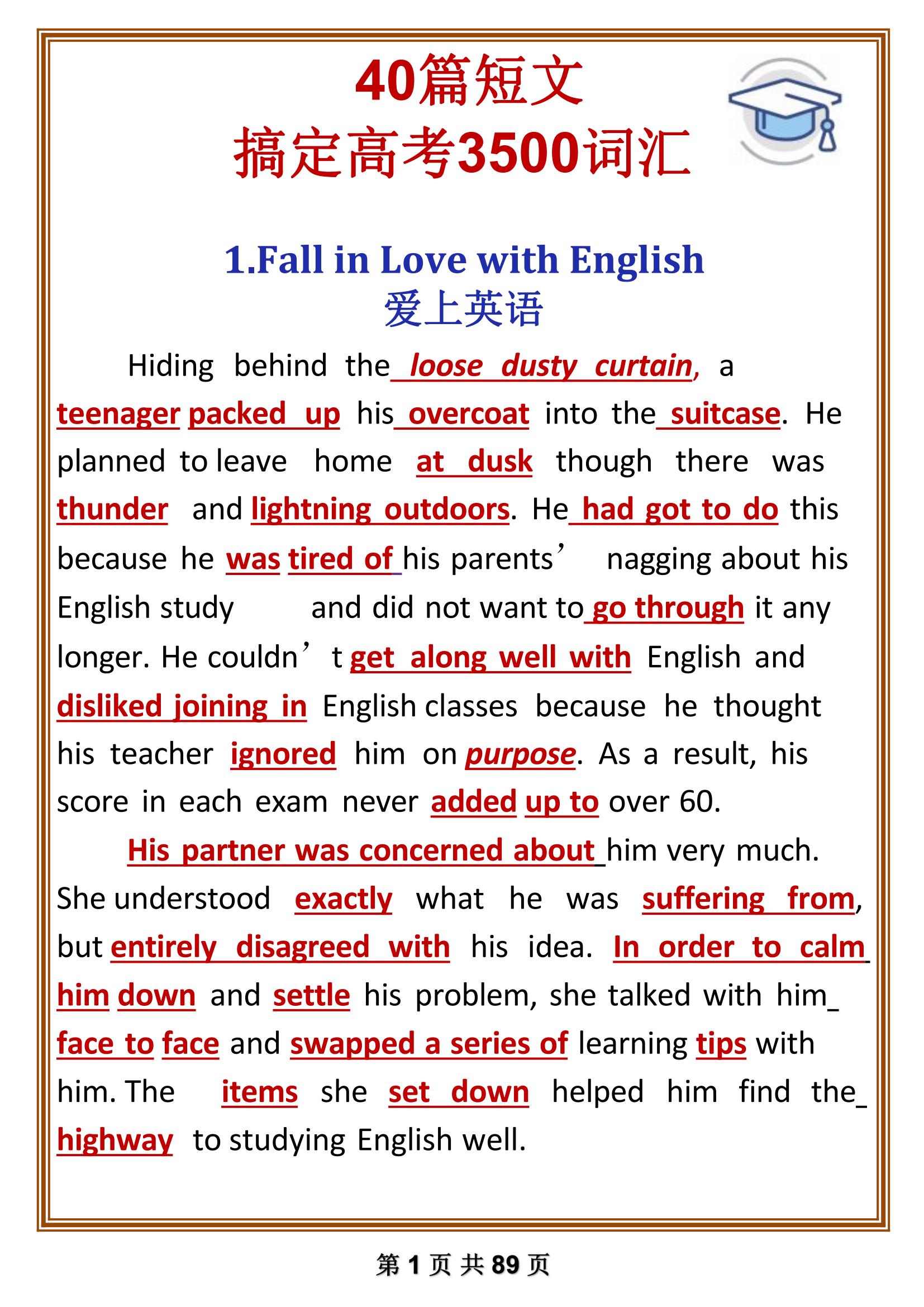大家好!人教版高中英语选修十电子书今天让小编来大家介绍下关于人教版高中英语选修一电子版,以下是小编对此问题的归纳整理,让我们一起来看看吧。
Section Ⅰ
Ⅰ.高频单词点击
1.centigrade (adj. & n.)摄氏温度的;摄氏温度
2.recipe (n.)菜谱
3.competent (adj.)有能力的;能胜任的→competence (n.)能力;胜任;本领
4.caption (n.)标题;说明;字幕
5.digest (v.)消化→digestion (n.)消化→digestive (adj.)消化的;助消化的
6.beneath (prep. & adv.)在……之下
7.adopt (v.)采用;收养→adoption (n.)采用;收养→adoptive (adj.)收养的
8.preview (vt.)预习;事先查看→review (vt.)复习
9.frequent (adj.)时常发生的;经常的→frequently (adv.)屡次地;频繁地→frequency (n.)屡次;频繁;频率
10.assess (vt.)评估;评定→assessment (n.)估价;估计
11.consult (vt.)请教;咨询→consultation (n.)商量;咨询→consultant (n.)顾问;提供咨询的专家
Ⅱ.重点短语必记
1.up to 取决于
2.in detail 详细地
3.apply to 应用于
4.agree with 同意
5.glance at 看一眼
6.on holiday 在度假
7.make comments 发表评论
8.set up 设立;竖立
Ⅲ.常用句型必备
1.It_is_the_same_with reading.
2.This is why there are prereading activities before many of the reading texts in this book.
3.Supposing you had just bought a new DVD player.
Ⅳ.课文缩写填空
The key to success lies in 1.frequent(frequency) practice and certain correct techniques. The same principle applies to a competent reader. Here are some 2.efficient(efficiency) methods of reading. First of all, before reading 3.in detail, good readers preview the text, such as learning a few of the new words, asking himself 4.what the captions tell about the text. Second, a good reader always reads actively not passively. Next, a good reader reads in different ways 5.depending(depend) on the purpose for reading. He reads carefully 6.when the book is to be chewed and 7.digested(digest). Last but not least, don't consult each new word you meet while 8.reading(read). Just guess 9.its meaning according to the context. Study the techniques above and adopt them in your reading, 10.and you will develop reading skills.
Section_Ⅱ
Warming Up & Reading — Language Points

1.competent adj.有能力的;能胜任的
If you want to learn English, you must first find a competent teacher.
如果你想学习英文,你必须先找一位称职的教师。
competence n. 能力;胜任
He is competent for this job.
他适合做这项工作。
He's not competent to look after young children.
他不能胜任照看小孩的工作。
[即境活用1] 用competent的适当形式填空
(1)You can gain a high level of competence in English.
(2)Make sure the company is competent to carry out the work.
2.digest
(1)vt.消化
Humans can not digest plants such as grass.
人不能消化像草一样的植物。
(2)vt.领会;领悟;理解
You should digest what he said.
你应该理解他说的话。
(3)n.文摘;摘要
I read only the digest of this novel.
我只读了这部小说的摘要。
digestion n. 消化;消化能力
digestible adj. 易消化的;可领会的
I did a little exercise to help my digestion.
我做了一点运动来帮助消化。
[即境活用2] 翻译句子
仔细阅读,你就会领会这篇文摘中的要点。
Read_carefully_and_you_will_digest_the_important_points_of_the_digest.
3.beneath
(1)prep.在……之下;在……掩盖下;在……下面(或底下)
The earth lay beneath a blanket of snow.
大地被厚厚的白雪覆盖。
(2)adv.在下方;在底下
They live on the floor beneath.
他们住在楼下。

under, beneath, below

[即境活用3] 用under,below,beneath填空
(1)The boy crawled under the fence.
(2)From the top of the mountain we could see a lake below us.
(3)The ground beneath my feet was soft.
4.adopt vt.
(1)采用
They adopted our methods.
他们采用了我们的办法。
(2)收养
They adopted a neighbor's child.
他们收养了邻居的一个孩子。
(3)正式通过;接受
The resolution was adopted by a vote of 180 in favour to 10 against it.
决议案以180票赞成10票反对获得通过。
温馨提示:adapt(改编;使适应)与adopt仅有一个字母之差,要注意它们含义的区别。
[助记] The young couple had no children of their own and adopted an orphan. After a few months, the child came to adapt to his new life.
这对年轻夫妇没有亲生孩子,领养了一名孤儿。几个月过后,这个孩子渐渐适应了他的新生活。
[即境活用4] 选词填空:adapt, adopt
(1)The old couple decided to adopt a boy and a girl though they had three of their own.
(2)The children couldn't adapt themselves to the bad conditions.
5.frequent adj.时常的;常来的;屡次的;习惯的
He is a frequent visitor of our family.
他是我们家的常客。
Traffic accidents are frequent on this road.
这条路上经常发生事故。
frequency n. 频繁;频率
frequently adv. 频繁地;习惯地;经常地
He frequently visits London.
他经常去伦敦。
[即境活用5] 用frequent的适当形式填空
(1)Sudden rainstorms are frequent on this coast.
(2)He goes to the market to buy stamps frequently.
(3)Accidents are happening there with increasingfrequency.
6.assess vt.评定;评估;对……进行估价(at ...);确定……的数额;评价;评论
My income was assessed at 20,000 dollars.
我的收入被评定为20 000美元。
It's too early to assess the effects of the new legislation.
要评价新法令的效果现在还为时过早。
assessment n. 评估;估价
What is your assessment of the situation?
你对当前形势评价如何?
[即境活用6] 完成句子
(1)The committee assesses_whether(评定……是否……) a building is worth preserving.
(2)Damages were_assessed_at (估计达)$ 500 billion in the disaster.
7.consult vt.请教;咨询;找……商量;查阅;查看
He consulted his lawyer about it.
他向他的律师请教那件事。
We lost our way and consulted the map.
我们迷了路因而查看地图。

consult, look up
(1)consult是向比自己更具权威的词典、参考书、医生、律师等请教咨询。
(2)look up后跟所查的字、词、信息、电话号码等;然后跟查阅的工具书等。

consult
[即境活用7] 完成句子
He consulted (查阅) his dictionary to look_up (查阅) the word "apotheosis".

1.apply to适合;对……适用
This traffic rule applies to all the drivers.
这条交通规则适用于所有的司机。
apply sth.to sth. 把……应用于…… 把……涂抹在……上
apply (to sb.) for sth. (向某人)申请某物
apply oneself to (doing) sth. 专注于……
We should apply what we have learned at school to daily life.
我们应该将我们在学校学到的知识应用到日常生活中。
He wants to apply to the company for a job as a salesman.
他想向这家公司申请一份售货员的工作。
The professor is applying himself to doing an experiment.
这位教授正聚精会神地做一项实验。
[即境活用8] 单句改错
(1)He is applying to a position in the local government.
to→for
(2)The worker is applying the paint on the wall.
on→to
2.up to
(1)(数量、程度)达到
The wind speed last night was up to 150 meters a minute.
昨晚的风速达到了每分钟150米。
(2)从事于;忙于
What are you up to now?
你现在在做什么?
(3)该由……;轮到……
It is up to us to give them all the help we can.
我们有责任全力帮助他们。
(4)直到
I didn't hear from him up to now.
直到现在我还未收到他的来信。
[即境活用9] 完成句子
(1)—What do you want to do next?We have half an hour until the basketball game.
—It's_up_to_you (你决定吧).Whatever you want to do is fine with me.
(2)Then what happens in the future is up_to_us (取决于我们) to plan and talk about.
(3)After a few weeks' trial, he was shifted to another department. As he was_not_up_to (不胜任) the work that had been given him.
3.in detail详细地
Give me all the details of the accident — tell me what happened in detail.
给我说说事故发生的详情,详细告诉我发生了什么事。
It is worthwhile dealing with this in some detail.
值得对此事进行较为详细的论述。
detailed adj. 详细的;仔细的
a detailed plan 详细的计划
"in+名词"结构小结:
(1)下列"in+名词"短语在句中常作表语、定语或补足语
(2)下列"in+名词"短语在句中常作状语
[即境活用10] 完成句子
(1)Don't talk about it in_detail (详细地). Just tell me the result in brief.
(2)He asked the press to apologize to him in_public (公开地).
(3)We'll try our best to help those in_trouble (处于困境中).
(4)The twins have nothing in_common (共有).
(5)It is said that the tiger is in_danger (在危险中).
4.glance at粗略地看一下;一瞥;瞥视
The girl glanced at the letter from her parents.
那个女孩匆匆阅读了她父母的来信。
stare at 盯着看……
glare at 怒视……
My brother was glaring at the dog.
我弟弟瞪着那条狗。
It's rude to stare at other people.
盯着别人看是不礼貌的。
[即境活用11] 用glance,glare,stare的适当形式填空
(1)On his way to work, he glanced at his watch.
(2)It is impolite to stare at a stranger.
(3)They didn't fight, but stood there glaring at one another.

1.It_is_the_same_with reading.
阅读也同样如此。
(1)It is/was the same with ...表示前面的情况也适合于另一者,尤其是在前面说了两种以上的情况的时候,就常用此句式,也可以用"So it is/was with+另一者"。
—Tom likes singing, but he doesn't enjoy dancing.
汤姆喜欢唱歌,但他不喜欢跳舞。
—It is the same with Mary.(=So it is with Mary.)
玛丽也是如此。
—The old man has been living in the country and has never been to a city.
那位老人一直住在乡下,从来没有去过城里。
—It is the same with his wife. (=So it is with his wife.)
他妻子也是如此。
(2)如果是一种肯定的情况也适用于另一者,则用"so+助动词+主语"。
—He lived here three years ago.
他三年前住在这儿。
—So did she.
她也一样。
(3)如果是否定的情况也适用于另一者,则用"neither/nor+助动词+主语"。
—I didn't pass the exam last time.
上次我考试没及格。
—Neither/Nor did I.
我也是。
[即境活用12] 完成句子
(1)—I can not sing the English song.
—Neither/Nor_can_I (我也不会).
(2)—I like reading novels, but I don't read every day.
—So_it_is_with_my_brother/It_is_the_same_with_my_brother (我弟弟也是如此).
(3)He went to the party and so_did_his_girlfriend (他女朋友也去了).
2.This_is_why there are prereading activities before many of the reading texts in this book.
这也是为什么本书许多阅读课文前有预读活动的原因。
This is why ...这就是……的原因,why引导表语从句,表示由上文的原因而导致的结果。
Mary broke the school rules; that was why she was punished by the headmaster.
玛丽违反了学校的规章制度;那就是她受到了校长惩罚的原因。
He was ill; that was why he was late for class.
他病了;那就是他上课迟到的原因。

"That/This is/was why+从句"与"That/This is/was because+从句"的区别:
(1)如果用来说明前面情况所产生的结果,就用"That/This is/was why+从句",相当于连词so的作用。
(2)如果用来说明前面情况的原因,就用"That/This is/was because+从句"。
—Why hasn't Jane been speaking to me for days?
简这些日子为什么不和我说话?
—It was because you spoke ill of her behind her back.
那是因为你在背后说了她的坏话。
It was raining heavily at that time.That was why we got there so late.
那时正下着大雨,那就是我们那么迟才到达那里的原因。
温馨提示:the reason (why ...) is that ...表示"(……)的理由是……",that引导表语从句,一般不能省略,而且也不用because或why代替。
[即境活用13] 用适当的连接词填空
(1)I don't buy the dress.That's because it didn't suit me.
(2)I had neither a raincoat nor an umbrella. That's why I got wet through.
3.Supposing you had just bought a new DVD player.
假设你刚买了一台DVD播放器。
supposing=suppose conj.假如,假使……
Supposing/Suppose the experiment fails, we'll suffer from a great loss.
假如实验失败了,我们将遭受很大的损失。
Suppose a company has a new breakfast cereal that it wants to sell.
假设有个公司想出售一种新的早餐麦片粥。
(1)suppose vt.推想;猜想vi.料想
suppose+thatclause 猜想,认为……
suppose+宾语+宾补 猜想,认为……
(2)I suppose so.
我认为是这样。
I don't suppose so.=I suppose not.
我不这么认为。
(3)be supposed to do应该做
be supposed to have done理应做过某事(但可能没做,含有虚拟意味)
We supposed him (to be) dead.
我们猜想他是死了。
I don't suppose he will come here.
我想他不会到这儿来。
We are not supposed to play football at this time.
我们不该在这个时间踢足球。
[即境活用14] 完成句子
(1)Supposing/Suppose_it_rains_tomorrow (假使明天下雨), what shall we do?
(2)Customers are_not_supposed_to_smoke (不该抽烟) here.
(3)Jack is_supposed_to_have_done/finished (应当完成了) his work now.
Section_Ⅲ
Learning_about_Language

Ⅰ.高频单词点击
1.shabby (adj.)破旧的;褴褛的→shabbiness (n.)邋遢
2.rainbow (n.)彩虹
3.acute (adj.)敏锐的→acutely (adv.)锐利地→acuteness (n.)敏锐;锐利
4.bent (adj.)弯曲的→bend (v.)弯曲 (n.)转弯;弯曲
5.currency (n.)货币;通货→current (adj.)通用的;现在的 (n.)潮流→currently (adv.)目前;当前
6.cuisine (n.)烹饪(法)
7.educator (n.)教育家→educate (v.)教育→education (n.)教育
8.seminar (n.) 研讨会;讨论发言会
9.acquisition (n.)获得;习得→acquire (v.)获得→acquired (adj.)习得的;养成的
10.ballet (n.)芭蕾舞
11.album (n.)薄;册;唱片集
Ⅱ.常用句型必备
I opened the oven to_find my daughter's cake on fire.
Ⅲ.单元语法聚焦
The Subjunctive Mood (虚拟语气)

1.shabby adj.
(1)破旧的;褴褛的
You looked rather shabby in those clothes.
你穿那种衣服看上去很寒酸。
He is a tramp in shabby clothes.
他是个衣衫褴褛的流浪汉。
(2)卑鄙的;不公正的
He gave me a shabby excuse.
他给了我一个不正当的借口。
[即境活用1] 完成句子
(1)The old captain returned in_shabby_clothes (穿着破旧的衣服).
(2)The boss often plays_a_shabby_trick (耍卑鄙的手段) on his workers.
2.acute adj.
(1)敏锐的
She still has very acute hearing, though she is eighty years old.
尽管她已经八十岁了,但她的听觉仍然很灵敏。
(2)[医]急性的;剧烈的
My legs are in acute pain.
我的腿痛得厉害。
acutely adv. 锐利地;剧烈地
acuteness n. 敏锐;锐利
[即境活用2] 用acute的适当形式填空
(1)He must have felt acutely disappointed when his job went to another man.
(2)She complained of acute pains in her chest.
3.bent adj.弯曲的;一心的
The handle is bent.
手柄弯曲了。
bend v.& n. 弯曲;转弯
bend (sb.) to ... (使某人)屈从于……
bend one's knees 屈膝
be bent on (doing) sth. 决心,专心致志做某事
He is bent on winning at all costs.
他决心不惜一切去争取胜利。
We'll not bend to the will of anyone.
我们不会屈从于任何人的意志。
[即境活用3] 单句改错
(1)He tried to bend his daughter under his wishes.
under→to
(2)She is bent to becoming a film star when she grows up.
to→on
4.acquisition n.[U]取得;获得;习得;[C]获得物;增添的人(或物)
Some people are only interested in the acquisition of wealth.
有些人只对获取财富感兴趣。
This is the latest acquisition to my library.
这本是我最近增添的藏书。
acquire vt. 取得;获得;学到(知识等)
acquired adj. 养成的;习得的
He acquired much knowledge of repairing computers.
他获得了许多电脑维修知识。
With the help of his English teacher, he acquired many good methods of English learning.
在英语老师的帮助下,他学到了许多英语学习的好方法。
[即境活用4] 用acquisition的适当形式填空
(1)How did he acquire the habit of stealing?
(2)He is a valuable acquisition to the team.
(3)Abstract art is an acquired taste.

I opened the oven to_find my daughter's cake on fire.
我打开烤箱发现女儿的蛋糕着火了。
to find ...是不定式短语作结果状语,表示意料之外的结果。在该用法中,不定式的前面常常带有only。
He hurried to school only to find the gate locked.
他匆匆赶到学校结果发现大门关着。
温馨提示: ing形式作结果状语时,表示自然而然的结果。
He fell from the tree, breaking his left leg.
他从树上掉下来,把左腿摔断了。
[即境活用5] 完成句子
(1)John hurried to the theatre, only_to_find_the_tickets_had_been_sold_out (结果发现票已经卖完了).
(2)The typhoon hit the coast,leaving_many_people_homeless (使得很多人无家可归).

虚 拟 语 气
虚拟语气表示说的话不是事实,或者是不可能发生的情况,而是一种愿望、建议或与事实相反的假设等,一般常用于正式的书面语中。
一、虚拟语气在条件句中的运用
1.虚拟语气在条件句中的谓语动词形式如下:
If I were ten years younger, I would start all over again.
如果我年轻10岁,我会从头开始的。(与现在事实相反)
You might have seen Mr.Smith if you had attended the lecture.
如果你参加了讲座,你也许会见到史密斯先生的。(与过去事实相反)
If it should rain tomorrow, we would stay at home.
假如明天下雨,我们就待在家里。(与将来事实相反)
2.虚拟条件句的省略和倒装
如果条件句中的if省略,须把条件句中的were, had, should放在条件从句的主语前面,从而构成倒装语序。
Had it not been for his help, I couldn't have finished the work in time.
要不是他的帮助,我是不会及时完成这个工作的。
Were you a bird, you could fly in the sky.
如果你是一只小鸟,就能在天空中飞翔了。
3.错综时间条件句(混合虚拟语气)
当虚拟语气的主从句所指的时间不一致时,应该根据各自谓语动词发生的时间采用相应的形式。
If you had taken my advice, you would know what to do now.
要是那时你听我劝告的话,你现在就知道该做什么了。
4.含蓄虚拟条件句
有时假设的条件不通过条件从句表达出来,而是暗含在单词、短语或上下文中,这时需要根据句中所表述的意义以及某些特定的信息词来判断此时需要采用的形式。常用词或短语有:without, but for, or, otherwise, with, but, even, in case of等。
Given more attention, the trees could have grown better.
如果给予更多的关注,这些树就会长得更好。
Without/But for your help I couldn't have returned home safely.
要不是你的帮助,我是不会安全回家的。
He would have gone to the party, but he was ill yesterday.
他昨天想去参加宴会,但是那时他病了。
The firemen arrived in time.Otherwise the house would have been burnt to the ground.
消防队员及时赶到了,不然的话,房子就烧毁了。
二、虚拟语气在名词性从句中的应用
1.宾语从句中的虚拟语气
(1)在表示坚持、命令、建议、要求等动词后的宾语从句中,谓语用"should+动词原形",should可省略。
一坚持:insist
二命令:order, command
三建议:suggest, propose, advise
四要求:request, require, demand, ask
The doctor advised that he (should) change his job.
医生劝他换工作。
温馨提示:suggest表"暗示;表明",insist表"坚持认为"时,不用虚拟语气。
The smile on his face suggested that he was satisfied with our work.
他脸上的笑容表明他对我们的工作很满意。
The man insisted that he had never stolen the money.
那个人坚持说他没有偷钱。
(2)wish后的宾语从句
I wish I remembered his Email.
我希望我记得他的邮箱地址。(现在)
I wish I had studied hard.
我多么希望我那时学习刻苦。(过去)
I wish you would go with us tomorrow.
但愿你明天跟我们一块去。(将来)
(3)would rather后的宾语从句也要用虚拟语气,一般过去时表示与现在或将来事实相反,过去完成时表示与过去事实相反。
I'd rather you came tomorrow.
我宁愿你明天来。
I'd rather you had passed the exam.
我宁愿你通过了考试。
2.主语从句中的虚拟语气
It is desired/suggested/proposed/required/necessary/important/strange/natural/a pity+that从句,从句中谓语动词用should+动词原形,should可以省略。
It is important that you should come here soon.
你快点来很重要。
It is suggested that the old man should be sent to hospital immediately.
有人建议立即把老人送往医院。
3.表语从句和同位语从句中的虚拟语气
advice, demand, desire, order, request, suggestion, proposal, requirement, recommendation等名词后的表语从句和同位语从句中,谓语动词用"should+动词原形",should可以省略。
We all agreed to his suggestion that we (should) go to Dalian for sightseeing.
我们都同意他让我们去大连旅游的建议。
Their desire was that a treaty should be signed at once.
他们的愿望是马上签订协约。
三、虚拟语气的其他用法
1.even if (though),as if (though)从句以及if only后的句子常用虚拟语气。
He treats the little girl as if she were his own daughter.
他对待这个小女孩就像她是自己的亲生女儿一样。
If only I had seen the film!
我要是看了那部电影多好啊!
温馨提示:even if (though)如果叙述的是事实,as if(though)如果有明显的迹象表示"有可能实现的事实"时,不用虚拟语气。
It is so cloudy.It looks as if it is going to rain.
阴天了,似乎要下雨。
2.It is (high/about) time that ...结构中,从句谓语动词要用过去时或用"should+动词原形(但should不可省略)"来表示虚拟语气。
It is (about) time that we had/should have a holiday.
是我们该度假的时候了。
It is high time that you taught/should teach him a lesson.
你该教训一下他了。
Section_Ⅳ
Using_Language

Ⅰ.高频单词点击
1.resemble (vt.)像;类似→resemblance (n.)类似;相似点
2.tend (vi.)倾向→tendency (n.)倾向;趋势
3.messy (adj.)肮脏的;凌乱的;杂乱的→mess (n.)杂乱;纷乱;混乱
4.tiresome (adj.)烦人的;令人厌烦的→tire (v.)使厌烦→tired (adj.)厌烦的→tiring (adj.)令人疲倦的;辛苦的
5.vague (adj.)含糊的;不清楚的→vaguely (adv.)含糊地;暧昧地
6.bonus (n.)红利;奖金;津贴
7.oral (adj.)口头的;口述的→orally (adv.)口头上;用口述;口服地
8.component (n.)成分;组成部分
9.concrete (adj.)具体的;有形的
Ⅱ.重点短语必记
1.tend_to (do sth.) 易于;往往会(做某事)
2.go shopping 去购物
3.rely on 依靠;依赖
4.have trouble (in) doing sth. 做某事费力
5.concentrate on 集中精力于
6.add up 加起来
7.make sense 有意义
8.congratulations on 祝贺……
Ⅲ.常用句型必备
1.I find it tiresome to sit and concentrate on anything for a long time.
2.It's never too late to learn.
3.I like to follow a map rather_than written or spoken directions.
Ⅳ.功能意念项目
Give advice
1.You should ...
2.Why don't you ...?
3.How about ...?
4.It's worth a go.
5.Do you know what else you might be able to do?
6.I've thought of something you could do.

1.resemble vt.像;类似
He strongly resembles his father.
他酷似他的父亲。
resemble sb./sth.in sth. 在……方面像……
She resembles her sister in appearance but not in character.
她的外表像她姐姐,但性格不像。
温馨提示:(1)resemble不能用于进行时态中,也无被动语态。
(2)resemble是及物动词,本身已含有"与……"的意思,故不必再加with。
resemblance n. 相似;相像
have some/no/little resemblance (s) to sb./sth.
与某人/物在某方面有一些/没有/几乎不相似
The resemblance between Tom and his brother was remarkable.
汤姆和他的哥哥十分相像。
Your story seems to have no resemblances to the facts.
你所说的似乎与事实不符。
[即境活用1] 介词填空/用所给词的适当形式填空
(1)The two objects resemble each other in nature.
(2)This is a disease resembling(resemble) flu in some way.
2.tend vi.倾向;趋向vt.照料;照管;接待;服侍
tend to do sth. 易于……;有……的趋势
tend to/towards sth. 朝某方向;趋于;趋向
I tend to know Middle Eastern countries pretty well.
我还算是比较熟悉中东国家的。
The coastline tends to/towards the south here.
海岸线在此处转向南方。
tendency n. 趋向;倾向;脾性
have a tendency to do sth. 有做……的倾向
His tendency to speak ill of others makes his roommates angry.
他老是说别人的坏话,使同寝室的人很生气。
[即境活用2] 完成句子
(1)He tends_to_get_angry (容易生气) when people oppose to his plan.
(2)She has a_tendency_to_forget (有遗忘……的倾向) things.
3.messy adj.肮脏的;凌乱的;混乱的
The house is always messy.
这房子总是乱糟糟的。
It was a messy job.
这是一份很脏的工作。
mess n. 肮脏;混乱;许多;大量
v. 弄脏;弄乱
in a mess 杂乱;在困境中
make a mess of 把……搞糟
mess up 弄糟
I have made a mess of things.
我把事情搞糟了。
This wind will mess my hair up.
这风会吹乱我的头发。
[即境活用3] 完成句子
(1)The economy of the country is in_a_mess (陷入困境).
(2)I don't want you to mess_up (弄乱) my nice clean kitchen.
4.tiresome adj.令人厌烦的;烦人的
This is really a tiresome job.
这真是令人厌烦的工作。
How tiresome!I have left my watch behind.
真烦人!我忘记戴手表了。
tire v. 使……累
tired adj. 感到累的
tiring adj. 令人厌倦的
get tired of=be tired of 对……厌倦
be/get tired from/with 因为……而劳累
I am/get tired of listening to the same music.
我讨厌总是听相同的音乐。
The boy was tired from long study.
那个男孩因长时间的学习而感到累了。
[即境活用4] 用tire的适当形式填空
(1)Reading small print tires the eyes very much.
(2)This child is sometimes tiresome.
(3)He got tired of teaching in the same school.

1.rely on依靠;依赖;指望
rely on sb./sth. to do sth. 指望/相信某人/某物会做某事
rely on doing sth. 依赖/信任/指望……
rely on it that ... 相信……;指望……
These days, we rely heavily on computers to organize our work.
现在,我们在很大程度上依赖电脑来组织安排我们的工作。
Don't rely on going abroad for our holiday; we may not be able to afford it.
不要指望去国外度假,我们可能负担不起。
You can rely on it that it will rain this weekend.
你放心好了,本周末一定会下雨。
[即境活用5] 一句多译
你可以相信我会帮助你。
(1)You_can_rely_on_me_to_help_you.
(2)You_can_rely_on_it_that_I_can_help_you.
2.make sense有意义;有道理;讲得通
This sentence just doesn't make sense, no matter how you read it.
无论你怎样读这个句子,它还是讲不通。
make sense of 理解;明白
make no sense 没道理;没意义
in a sense 在某一方面;就某种意义来说
in no sense 决不(放于句首时常用部分倒装)
There is no sense in doing sth. 做某事没道理
The lectures offer students the chance to make sense of English grammar.
这些讲座提供机会让学生理解英语语法。
Planning so far ahead makes no sense — so many things will have changed by next year.
提前这么久做计划没有意义——到第二年许多事情都会发生变化。
In no sense do you tell lies to your family.
你决不可向家人撒谎。
[即境活用6] 完成句子/介词填空/用所给词的适当形式填空
(1)老师所解释的讲不通。
What the teacher explained didn't make_sense.
(2)你能理解这个句子吗?
Can you make_sense_of the sentence?
(3)What she says is true in a sense, but not always.
(4)There is no sense in arguing (argue) with her about the affair.

1.I find it tiresome to sit and concentrate on anything for a long time.
如果长时间坐着并集中注意力于某事,我会感到很厌倦。
本句为find+it(形式宾语)+宾语补足语(形容词/名词)+动词不定式(真正宾语)句型。
(1)此句型完整的形式是:主语+find/think/feel/make/consider ... +it+n./adj.+for/of sb.to do ...。其中for/of引出动词不定式的逻辑主语。其中it是形式宾语,代替不定式。
I consider it possible to have a talk with him.
我认为与他交谈一下是有可能的。
(2)it作形式宾语也可以代替从句。
I have made it clear that I object to the plan.
我已经表明我反对这个计划。
(3)当宾语补足语是no use, no good, useless等时,真正的宾语要用动名词。
I consider it no use talking with him; he won't listen to others.
我认为和他交谈无用,他不会听别人的话的。
(4)it 作为形式宾语还可以用在像I like/hate/appreciate/enjoy/dislike/prefer/depend on/rely on/see to it that/when ...等句式中。
I like it when there are friends around me.
我喜欢有朋友和我在一起。
[即境活用7] 代词填空/用所给词的适当形式填空
(1)I like it in the autumn when the weather is clear and bright.
(2)I think it important for students to_learn (learn) English well.
2.It's never too late to learn.
活到老,学到老。
本句为"too ... to"结构,表示"太……而不能"。
The question is too difficult to answer.
这个问题太难而无法回答。
(1)too ... to ...和表示人的心理状态的形容词连用,不表示否定意义,此类词有happy, glad, ready, anxious, eager, willing, pleased, thankful等。
He is too ready to talk.
他爱说话。
(2)把never/not等否定词放在too前,表示肯定,译作"并不太……所以能……";加在to前,译作"太……不至于不……"。
He is too careful not to have noticed it.
他那么细心不会注意不到这一点。
(3)cannot ... too ...无论……也不过分;越……越好
You cannot be too careful.
你无论怎么仔细也不过分。
[即境活用8] 完成句子
(1)It's too late for_the_work_to_be_done (工作做不完).
(2)The shop manager always says to his assistants,"We can never_be_too_polite_to (对……越有礼貌越好) our customers."
3.I like to follow a map rather_than written or spoken directions.
我喜欢按照地图而不是书面或口头指示(找到目的地)。
(1)rather与than连用时,其作用相当于连词,通常用于平行结构中。常译为"与其说……不如说……";"不是……而是……"。
She is a teacher rather than an artist.
她是老师而不是艺术家。
I'm rather bored than tired.
我与其说疲惫,不如说是厌倦。
(2)rather than可用于prefer之后,构成句型:sb.prefer to do sth.rather than do sth.,常译为"某人宁愿做……而不愿做……"。
He preferred to stay at home watching TV rather than go to the concert.
他宁愿坐在家里看电视也不愿去听音乐会。
(3)rather than后接动词不定式时,可省略不定式符号to。
I decided to write rather than (to) telephone.
我决定写信而不是打电话。
or rather 确切地说
other than 除了
would rather do A than do B 宁愿做A而不愿做B
He had no friends other than Mary.
他除了玛丽,没有朋友。
Her husband got home late, or rather at one o'clock in the morning.
她丈夫回家很晚,确切地说,是凌晨1点。
[即境活用9] 用所给词的适当形式填空
(1)I would rather stay (stay) home than go (go) on a trip in such a rainy day.
(2)Rather than ride (ride) on a crowded bus, he always prefers to_ride (ride) a bicycle.
建 议 信


【写作任务
假定你是李华,你的英国朋友Peter发来电子邮件向你咨询如何才能学好中文。请你根据下列要点写一封电子邮件回复他。
要点:
1.参加中文学习班;
2.看中文书刊、电视;
3.学唱中文歌曲;
4.交中国朋友。
注意:
1.词数100左右;
2.可适当增加细节,以使行文连贯。
【范文在线
Dear Peter,
I'm glad to receive your letter asking for my advice on how to learn Chinese well.Here are a few suggestions.
First, it is important to take a Chinese course, as you'll be able to learn from the teacher and practice with your fellow students. Then, it also helps to watch TV and read books, newspapers and magazines in Chinese whenever possible. Besides, it should be a good idea to learn and sing Chinese songs, because by doing so you'll learn and remember Chinese words more easily. You can also make more Chinese friends. They will tell you a lot about China and help you learn Chinese.
Try and write to me in Chinese next time.
Best wishes.
Li Hua
【靓点点击
1.首先格式正确,符合书信体的要求,结构符合给人提建议的三段式:提出情况(asking for my advice on how to learn Chinese well),写建议的背景。提出自己的建议。结束语及签名。全文重点突出,层次分明。
2.使用了一些过渡词及连接词first, then, besides等,文中使用了分词短语asking for my advice ..., by doing so,原因状语从句as you'll be able to ... because by doing so you'll ...,倒装句Here are a few suggestions,形式主语it is important to ...和it also helps to ...,省略句whenever possible,使文章句式多样,语言鲜活。

建议信是书信的一种,属应用文范畴,写这类文章应注意以下几点:
一、基本框架
1.开头(beginning)——开门见山,向对方陈述自己的观点(state your idea)。
2.主体(body)——对所提出的问题进行分析并说明理由,接着提出自己的建议(reasons and evidence)。
3.结尾(ending)——呼应开头,重申观点(restate your opinion)。
二、注意事项
1.开门见山,直入主题。在书信正文的开头找准话题的切入点,自然而然地引出自己想要谈的主题。写信时要充分了解情况,有的放矢,以提高书信的针对性。
2.给出希望对方采取或者终止某种行为的理由。在陈述理由的过程中要换位思考,尽量为对方考虑。要用事实说话,以增强说服力。
3.语气要和缓,让对方考虑你的想法或者建议,以理服人是关键,不能把自己的想法强加于人。
4.给出合理建议,通过提建议让对方明确行动的方向,从而达到写信的最终目的。

假设你叫刘云,准备参加学校举行的"我给市长提建议"英语作文大赛。目前,你所在的城市已经基本实现城乡公交一体化,由此你想到了公交车司机们。请你结合下表提示,用英语给市长(Mayor)写一封信。词数100左右。
________________________________________________________________________
________________________________________________________________________
________________________________________________________________________
________________________________________________________________________
参考范文:
Dear Mr.Mayor,
I'm writing to you about starting a Bus Drivers' Day.
These years, we are happy to have buses going between every city, every town and almost every village. Now more and more people both in cities and in the countryside are traveling by bus, so more and more bus drivers are working for us. They have to work very hard, from morning till night. It's not easy for them, especially during holidays.
To thank them, I think it necessary to have a Bus Drivers' Day. It will be good if we celebrate it on October 7th every year, because it's the last day of National Day Golden Week, and people can celebrate it with bus drivers, even the buses.
Buses are playing an important role in our daily life, and I hope you can spare your time and think about my idea.
Best wishes!
Liu Yun
本文到此结束,希望对大家有所帮助。









